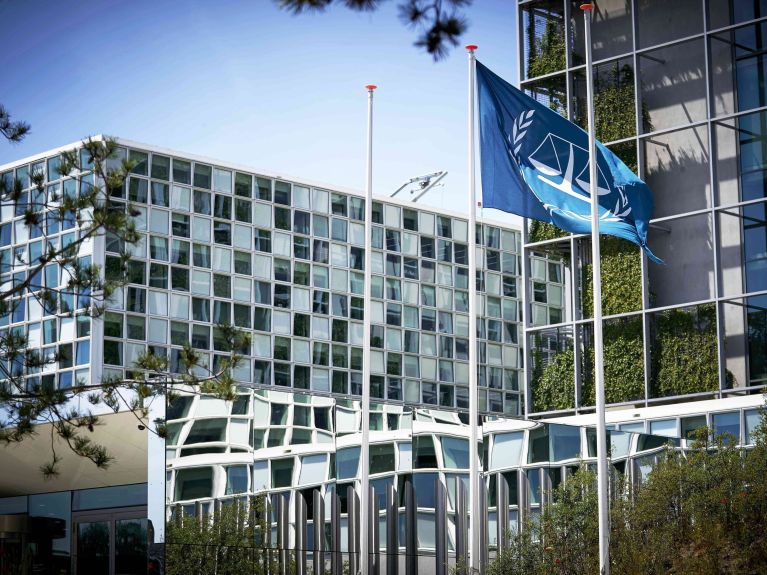A milestone in international law
Germany is one of the biggest supporters of the International Criminal Court and is committed to further strengthening it.

The International Criminal Court celebrated an anniversary in July 2023: 25 years ago – on 17 July 1998 – the Rome Statute was adopted, laying the foundation for the work of the International Criminal Court in The Hague. The ICC is not part of the United Nations, but an organisation in its own right whose aim is to uphold a rule-based global order: International relations are determined not by arbitrariness and force, but by laws and standards. Time and again, however, the ICC finds itself reaching its limits. Germany is thus calling within the international community of states for it to be strengthened.
When does the International Criminal Court act?
The International Criminal Court (ICC) prosecutes those found guilty of the most serious international crimes. Specifically, these are genocide, war crimes, crimes against humanity and, to a limited extent, the crime of aggression. It is a court of last resort, which means that it only acts when national courts are unwilling or unable to prosecute such crimes.
Why was the ICC established?
The community of states established the International Criminal Court in an attempt to plug a gap in international law, thereby allowing those accused of particularly serious international crimes to be prosecuted. In many cases, this did not happen due to a lack of will or jurisdiction: Perpetrators remained unchallenged and went unpunished. In order to change this, a diplomatic conference was convened in Rome in 1998. Following tough negotiations, the Rome Statue was agreed and entered into force on 1 July 2002. The adoption of the statute is seen as a breakthrough and a “key moment in history,” as Germany’s Foreign Minister Annalena Baerbock put it.
Where are the limits to the court’s jurisdiction?
Though intended to be a universal court, it continues to fall short of this goal even 25 years after being established. This is due in part to its action radius, which is still limited: There are currently 123 signatories to the ICC, yet the UN has 193 member countries. Countries that have not signed up to the ICC include such powerful states as the USA, Russia and China. Furthermore, the ICC is reliant on the assistance of its signatories because it has no police forces at its disposal and cannot therefore execute an arrest warrant itself.
In the spring of 2023, the International Criminal Court issued an arrest warrant against Russia’s President Vladimir Putin. On what basis?
Contrary to what one might have presumed, Putin is not to be prosecuted for the attack on Ukraine but for the unlawful deportation of Ukrainian children to Russia. The accusation is of “war crimes”. However, the Russian president and Maria Lvova-Belova, the country’s commissioner for children’s rights who has likewise been indicted, have no need to fear the arrest warrants for as long as they remain in Russia. This is because the ICC cannot arrest them there. If on the other hand Putin leaves the country, it is possible for other states to extradite him to The Hague.
Who has already been sentenced by the court so far?
By August 2023, the ICC had heard a total of 31 cases, some of which involved more than one suspect. The judges have issued 40 arrest warrants, 16 of the 40 individuals still being at large. Ten defendants were found guilty, while four were acquitted. In 2019, for example, the ICC sentenced the former rebel leader Bosco Ntaganda to 30 years in prison for numerous massacres in the east of Congo.
What role does Germany play in the International Criminal Court?
Germany is one of the ICC’s biggest supporters. Hans-Peter Kaul, Germany’s chief negotiator at the 1998 negotiations in Rome, was one of the main drivers of the project on behalf of the German government. Later he became the first German judge in The Hague. Furthermore, Germany is the biggest contributor to the ICC after Japan.
Which reforms is Germany pushing for?
Germany wants to further develop the crime of aggression at the ICC. Though this was included in the Rome Statute, it served merely as a placeholder. The Statute was amended accordingly in 2010. Ever since, the ICC has been able to pursue such crimes, though only if both the victim and the aggressor states have ratified this amendment. This applied only to 45 states in 2023, however, making it correspondingly difficult for the ICC to act in such cases.
That is why Germany is proposing that the Statute should be amended again in 2025 so that it is sufficient if only the victim state falls within the jurisdiction of the ICC. In general, the German government is committed to a rule-based international order and views the International Criminal Court as an important part of this.
Where do those convicted by the ICC serve their custodial sentences?
The United Nations Detention Unit with 84 individual cells is situated around three kilometres from the ICC. This is where defendants who have been transferred to the court remain in custody during their trial until a verdict is reached. Lawful terms of imprisonment are served in prisons of European signatory states that have declared themselves willing to take convicts. When the verdict is announced, the ICC selects a suitable country from a list. Germany also supports the ICC’s work by taking convicts who need to serve their custodial sentences.


